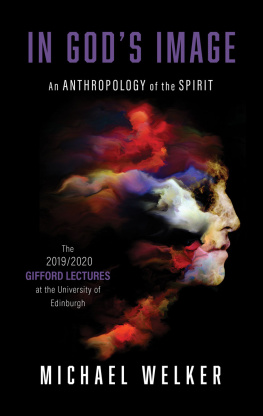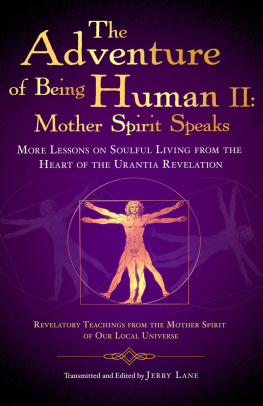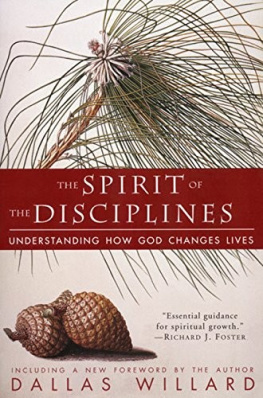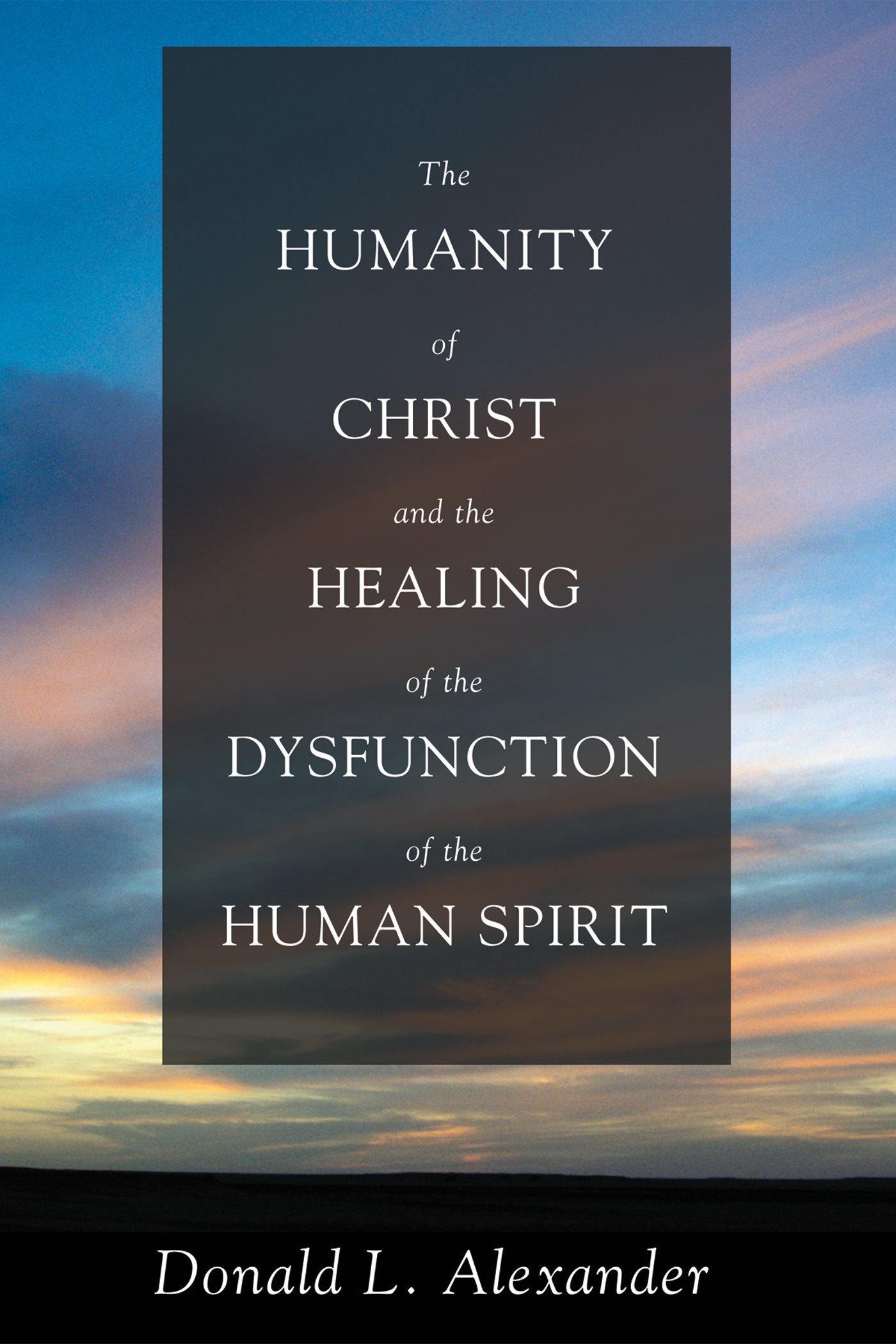The Humanity of Christ and the Healing of the Dysfunction of the Human Spirit
Donald L. Alexander
Setting the Context
The Problem, Focus, and Thesis
P rotestant Evangelical Christians have developed little or no positive theological perception of the significance of the human spirit either in initial relationship with God or in the development of a spiritually mature Christian life. This lack is due in part to the de-spiriting of the human person within Protestant Evangelical theology. Grace alone has dominated the interpretation of salvation so that any movement on the part of the human spirit is viewed as an attempt to bypass grace alone . In this study, I will argue that the human spirit performs a significant role in both the Christians initial relationship with God and in the healing (sanctification) of human nature.
Renewed interest in the significance of the human spirit and its relation to the divine Spirit and the Christian life occurred for me as a result of reading a chapter written by neurologist Warren S. Brown, Cognitive Contributions to Soul, in the book he coauthored with Nancy Murphy and H. Newton Malonynamely, Whatever Happened to the Soul? Scientific and Theological Portraits of Human Nature and a course on Holiness in Biblical Perspective that I taught at Bethel University. In his chapter, Brown critiques the reductive physicalism view that human persons are nothing but a body, and that human behavior and personhood can be exhaustively explained simply by means of genetics or neurological cognitive functions of the brain.
In contrast Professor Brown contends that the concept of the human soul arises out of experiences of personal relatedness, and that personal relatedness designates a realm of unique human capacity and experiences which would include concepts, such as, consciousness of self, personal agency and responsibility, ability to give and receive love, communication with God, and the experience of transcendence.
If one accepts Professor Browns viewpoint that the nature of the human soul constitutes those emergent properties attributed to the experiences of personal relatedness, what, then, fills the vacuum of the generally embraced theological understanding of the human soul that not only designates that dimension of the self that is immortal and continues beyond death, but also constitutes one of the significant features marking the uniqueness of human persons within the created order of all living things? In other words, with the removal of the interpretation of the human soul as that immortal entity within human nature that persists beyond death, what, then is theologically unique within human nature that constitutes the uniqueness of human persons within the created order of all living things and that simultaneously fulfills this critical substantive gap in the absence of the immortal soul within human nature, and is furthermore not defined as the attributes of emergent properties of brain function? I propose for our reflection that the human spirit is a credible candidate.
Holy Scripture not only speaks of the significance of the human spirit but also of its independent status and distinct role in association with the other constituent features of human nature. For example, consider the Apostle Pauls statement, Even though I cannot be physically present with you, I will be with you in spirit ( Cor :). Or again, consider the text in Hebrews :, in which the human spirit denotes a unique capacity within human nature as an entity associated with but also as independent of the human soul. Hebrews : states, For the Word of God is alive and active. Sharper that any double-edged sword; it penetrates even to dividing soul and spirit , joints and marrow. Or again, The grace of the Lord Jesus Christ be with your spirit (Phil :; Phlm :). Finally, May your whole spirit, soul, and body be kept blameless ( Thess :). Here the Apostle Paul presents the human spirit as a separate entity in addition to but distinct from the body and soul. In addition, it is often said in daily conversation that upon the death of a friend that the physical, concrete body is placed in the gravenow regarded as a corpse, but the spirit of the person ascends to heaven to dwell with God.
If the human spirit is the unique capacity within human nature that enables persons to encounter both God and others, the function of the human spirit, then, has significant implications for living the Christian life.
It may be helpful at this juncture to note two overarching-undergirding Protestant Evangelical interpretative viewpoints of the Christian life. The difference between the two interpretative perspectives is that of emphasis and focus, but with far-reaching implications for the summons to live a life pleasing to God ( Thess :, ). The first viewpoint underscores the basic thesis of the book and expresses the conviction that God created human creatures and redemption in order that through Gods love and grace and our continued response to this love and grace we might be restored to our original humanity as created in the image of God. The second interpretive viewpoint, while generally accepted, though often unexamined within a large segment of the Protestant Evangelical Church, can be stated as: God created human creatures in order that they might become Christians.
This second viewpoint implies that the primary purpose of redemption and the work of the Holy Spirit reside exclusively in the task of evangelism; that is, that God views humans as a myriad of individual sinners who need the redemption found in Christ. Clearly, we must never diminish or distort the unalterable biblical teaching that through faith in the redemptive work of Jesus Christ forgiveness of sin is experiencedenabled by the work of the Holy Spirit.
Unfortunately, an inherent problem frequently arises with this perspective when encountering the demands of the Christian life. This problem emerges as the result of a dualistic interpretation of the Christian life. While God does the justifying-forgiving part of the salvation experience, a second demand is inserted; namely, the believers part. The believers part entails the responsibility to live holy lives, and to be a faithful and obedient disciple of Christ. Unfortunately, this second part is often understood by believers as a necessary condition for continuing to remain in the grace, love, and blessing of God. If, however, every believer possesses a sinful nature , the requirement of the second part becomes not only unrealistic but also impossible. This problem is greatly enhanced if the Christian life is interpreted within a law-based context which is frequently the problem in interpreting the believers part. Noting the fact that the function of the law is to condemn every violation a person commits, as the Apostle Paul states, The law was brought in so that the trespass might increase (Rom :), believers having this view are, then, constantly confronted with their limitations and sinfulness regardless of the nature of the offense due to the power of the law. It has been my observation, having served as an interim teaching pastor in over fifteen Protestant Evangelical churches, that many evangelical believers live their Christian life with a large sense of guilt due to the power of the law. Even in the life of a believer who has been renewed by the Spirit, the law exists to condemn every violation, both biblical and those imposed by other sources; such as, denominational ones, etc. This is not meant to imply that the law is evil. But co-opted by sin, the law preforms a duty other than its original purpose. Under the control of the divine Spirit the law becomes a guide for holy living. Klyne Snodgrass argues that the law obtains its function from the sphere in which it is placed; either that of sin or of the Spirit. Nevertheless, in a sin-dominated situation the law brings an intensification of sin even for the believer who has been renewed by the spirit and therefore desires to do the good.










